-
-
- Council Members
- Role of Council Members
- Council meetings
- Council elections
- Previous election results
- Dr Louise Allum
- Dr Sam Bescoby
- Dr Andrew Clemence
- Dr Tshidi Gardiner
- Dr Reginald Godwin
- Paddy Gordon
- Dr Danielle Greenberg
- Dr Gerard Henry
- Dr Richard Hillman
- Dr Benjamin Kennedy
- Dr Tom Lonsdale
- Dr Darren Partridge
- Martin Peaty
- Alison Price
- Dr Peter Robinson
- Dr Jennifer Simmons
- Dr Sadie Spencer
- Dr Mary Thomas
- William Wilkinson
- Dr Lara Wilson
- Past-Presidents
-
-
-
-
-
- About extra-mural studies (EMS)
- EMS requirements
- Information for vet students
- Information for EMS providers
- Information for vet schools
- Temporary EMS requirements
- Practice by students - regulations
- Health and safety on EMS placements
- EMS contacts and further guidance
- Extra-mural studies fit for the future
-
-
- Code of Professional Conduct for Veterinary Surgeons
- Code of Professional Conduct for Veterinary Nurses
- Contact the Advice Team
- XL Bully dog ban
- 'Under care' - guidance
- Advice on Schedule 3
- Controlled Drugs Guidance – A to Z
- Dealing with Difficult Situations webinar recordings
- FAQs – Common medicines pitfalls
- FAQs – Routine veterinary practice and clinical veterinary research
- FAQs – Advertising of practice names
- GDPR – RCVS information and Q&As
New RCVS President promises a presidential year focused on listening and engagement
13 July 2022
As the new President of the Royal College of Veterinary Surgeons (RCVS) for 2022-23, Dr Melissa Donald MRCVS has promised to spend much of the year listening to veterinary professionals and communities across the UK, to better understand the issues affecting them.
The College’s 2022 Annual General Meeting took place at One Great George Street in Westminster on Friday 8 July, where Melissa was confirmed as the 151st RCVS President by her peers on RCVS Council. Melissa, who is the 11th female President of the RCVS, is also following in the footsteps of her immediate predecessor, and now Senior Vice-President, Dr Kate Richards MRCVS in leading an all-female Officer Team, as Dr Sue Paterson FRCVS was confirmed as Junior Vice-President.
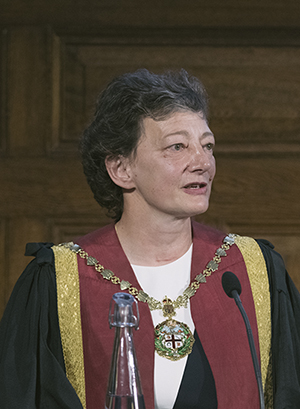 Melissa (pictured) graduated from the University of Glasgow School of Veterinary Medicine in 1987, starting her career as a food animal intern at Iowa State University in the United States before moving into mixed veterinary practice in Ayrshire in 1990. Over the next 25 years, Melissa and her husband Kenny developed Oaks Veterinary Centre into a small animal practice with a focus on dentistry.
Melissa (pictured) graduated from the University of Glasgow School of Veterinary Medicine in 1987, starting her career as a food animal intern at Iowa State University in the United States before moving into mixed veterinary practice in Ayrshire in 1990. Over the next 25 years, Melissa and her husband Kenny developed Oaks Veterinary Centre into a small animal practice with a focus on dentistry.
She was first elected to Council in 2016, was re-elected in 2020 and has served on a number of committees including the Education Committee and Finance & Resources Committee, and, since 2019, has served as Chair of the Standards Committee, which is responsible for setting and reviewing the Code of Professional Conduct and its supporting guidance. As Chair of the Standards Committee, she has led the development of proposed new guidance on under care and out-of-hours emergency care and pain relief, the consultation on which will soon be launched.
Melissa has also been President of the British Veterinary Association’s Scottish branch and the Ayrshire Veterinary Association and, outside of work, enjoys running, and caring for her dogs, cats and sheep.
In her opening speech as RCVS President, Melissa outlined her sense of community with her fellow vets, as a relatively small but prominent profession that punches above its weight, and how she intended to strengthen this as President.
Melissa said: “When I looked this up in June, there were over 300,000 doctors registered with the General Medical Council. We, the veterinary profession, have around 30,000 registered with the RCVS to look after farmed, pet, lab animal, exotic, zoo and wildlife species. In other words, all animals EXCEPT the human, and we protect humans too, with public health work!
“Even excluding farmed fish, over 300 million animals are being cared for by 30,000 professional veterinary surgeons and their teams. That is the scale of our small but mighty community. Being part of a community doesn’t mean we all have to be clones of each other, but a group that can agree to disagree, and is there for each other in times of need.
“We are part of many different community circles: family, school, online, college, work and hobbies to name a few, and many interconnect with each other just like a massive Venn diagram. Some people wish to keep the circles separate, but to me they are all intrinsically connected, and we are the sum of each part of our lives, and that is what makes us who we are. Of course, this doesn’t mean we have to be everything to everyone 24/7, as ‘me time’ is precious, and finding that space to breathe is what helps us feel grounded.
“With this close proximity to each other, communication is key. My mother has offered me many wise words over the years, most frequently being ‘engage brain before opening mouth’ but just as important as speaking is listening and actually hearing what is being said. So, over this year I will try to get out and about as much as possible, focus on hearing what our community is saying and engage in many conversations as we work together. After all, I am the ‘nomadic’ president, of no fixed abode, at least until we all get to move into the new headquarters in Hardwick Street.”
She concluded her speech (which is available to read in full at www.rcvs.org.uk/features) by thanking those who had stood behind her throughout her life and her veterinary career including her parents, family, teachers, university and extra-mural studies (EMS) mentors and work and RCVS colleagues.
AGM business
Dr Kate Richards, RCVS President 2021-2022, opened the RCVS AGM at 11am with the approval of the minutes of the previous year’s AGM and the formal presentation of the RCVS Annual Report and Financial Statements for the year ending 31 December 2021, which is available to download from our Publications page.
Members of the RCVS were given the opportunity to ask questions about the Annual Report in advance of the meeting, as well as those present being able to ask questions from the floor. No questions were received or asked.
RCVS Council election, appointments and retirements
Next, the AGM moved on to the results of the 2022 RCVS Council election. Dr Sue Paterson FRCVS was welcomed back on to Council after she was re-elected, along with newly-elected members Olivia Cooke MRCVS and Dr Abbie Calow MRCVS. All three will serve four-year terms on RCVS Council. Also welcomed formally to Council was Will Wilkinson MRCVS, who, following the resignation of Colin Whiting from RCVS Council in June, had taken his place as the closest runner-up in the 2021 RCVS Council election.
Appointed lay members of RCVS Council Professor Derek Bray, Claire McLaughlan, and Tim Walker were each re-appointed for a further four-year term, to July 2026.
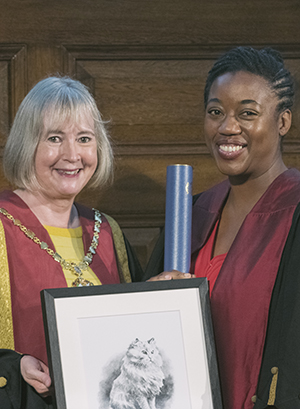 Turning to retirements, the first farewell was to Senior Vice-President Dr Mandisa Greene MRCVS, who was retiring after eight years on Council, including serving as RCVS President from 2020-21. She was praised by Kate for being a pioneer as the College’s first black Council member and President and for her work on diversity, equality and inclusion, including through two prominent Black History Month campaigns, and for her role as Chair of the Practice Standards Group, during which there have been developments including veterinary nurses being able to become Practice Standards Scheme Assessors, and the bolstering of standards around wellbeing, sustainability and quality improvement.
Turning to retirements, the first farewell was to Senior Vice-President Dr Mandisa Greene MRCVS, who was retiring after eight years on Council, including serving as RCVS President from 2020-21. She was praised by Kate for being a pioneer as the College’s first black Council member and President and for her work on diversity, equality and inclusion, including through two prominent Black History Month campaigns, and for her role as Chair of the Practice Standards Group, during which there have been developments including veterinary nurses being able to become Practice Standards Scheme Assessors, and the bolstering of standards around wellbeing, sustainability and quality improvement.
The next was Colonel Neil Smith FRCVS, who had served on Council for a total of 16 years (2004-2008 and 2010-2022) including as President in 2013-14. Kate noted that in Neil’s presidential year progress was made on shaping the College’s new Royal Charter, which would come into force in 2015, including the merging of the List and the Register of Veterinary Nurses, the recognition of VNs as associates of the RCVS and clarification of the role and remit of the RCVS. She also praised Neil as a champion and awareness-raiser on issues related to veterinary mental health and wellbeing as the first Chair of the Mind Matters Initiative when it was launched in 2015.
VN Council election and retirements
Turning next to the RCVS Veterinary Nurses (VN) Council, its chair Matthew Rendle RVN welcomed newly-elected members Holly Witchell RVN and Jessica Beckett RVN for their three-year terms on VN Council.
In terms of retirements, Matthew first said goodbye to Jane Davidson RVN after three years on VN Council. Matthew said that Jane, as a historian of the veterinary professions, had come into her own during the 2021 Diamond Jubilee year for veterinary nursing, contributing to webinars on the history of the profession and a commemorative e-book.
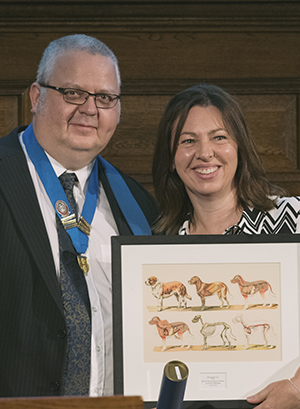 Next came Liz Cox RVN, who retired after 11 years on VN Council, including as its Chair from 2015 to 2018. Matthew said that Liz had been dedicated to progress within the veterinary nursing profession, fronting the campaign on protection of the VN title, and being instrumental in the launch of the joint RCVS and British Veterinary Nursing Association (BVNA) VN Futures project, encouraging members of the profession to help shape its future by identifying areas for progress, for example, around post-registration qualifications.
Next came Liz Cox RVN, who retired after 11 years on VN Council, including as its Chair from 2015 to 2018. Matthew said that Liz had been dedicated to progress within the veterinary nursing profession, fronting the campaign on protection of the VN title, and being instrumental in the launch of the joint RCVS and British Veterinary Nursing Association (BVNA) VN Futures project, encouraging members of the profession to help shape its future by identifying areas for progress, for example, around post-registration qualifications.
Election of Officer Team
Following the conclusion of the AGM, there was then a short meeting of the newly-constituted RCVS Council to approve the 2022-23 Officer Team of Dr Melissa Donald as RCVS President, Dr Kate Richards as Senior Vice-President, Dr Sue Paterson as Junior Vice-President and Dr Niall Connell as RCVS Treasurer.
RCVS Council members voted to approve the team.
CEO’s address
Next was the address from RCVS Chief Executive Officer, Lizzie Lockett, who gave an overview of what the College had achieved in the previous presidential year.
Particular highlights she pulled from the achievements of the year were: the purchase of a new headquarters for the College at Hardwick Street, Clerkenwell; the progress on the proposed guidance for under care; the veterinary workforce project including the Workforce Summit in November 2021; the ongoing work on diversity, inclusion and widening access; the development of new accreditation standards; and the launch of the RCVS Academy.
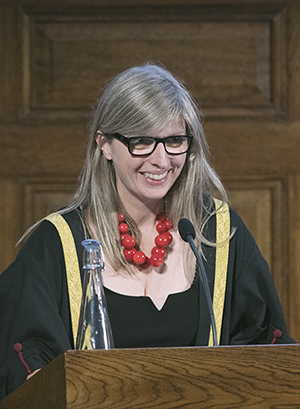 On the latter Lizzie said: “We will also be supporting vets and nurses to meet our standards via our new online RCVS Academy which was launched last month – a really great initiative that brings together accessible learning in one place.
On the latter Lizzie said: “We will also be supporting vets and nurses to meet our standards via our new online RCVS Academy which was launched last month – a really great initiative that brings together accessible learning in one place.
“There are two types of regulator – those who say ‘we set the standards, it’s up to you to meet them’ and those who recognise that it’s in the best interests – in our case, of veterinary professionals, animal health and welfare, and the public – if regulated professionals are supported in meeting those standards set for them by their peers.
“The Academy helps us meet our objective of being a compassionate regulator that wants our members to succeed, so I would encourage you to go and look.”
Lizzie also praised Kate for her skill in connecting with others, particularly in her efforts to support the push for new veterinary legislation and ended by praising the RCVS staff, saying: “We had our first in-person all-staff meeting in three years and it was so amazing to see everyone – or nearly everyone – together in one place again. It was a fantastic opportunity to reflect on how diverse our staff body has become – we have recruited many new people over the last year or so.
“Yet the shared values – of compassion, straight-talking, diversity and inclusion, and forward-thinking – really shone through in the excellent conversations that were had, the fund-raising efforts to support war-torn Ukraine, and the willingness to push ourselves and to support each other.
“I have been so proud that the staff team that supports the veterinary professions – professions that, in most cases, are not their own – do so with huge passion, energy and commitment. I know that not all members of the professions get to see this first hand – but perhaps, once we can welcome you to Hardwick Street, you will!
The full text of Lizzie’s speech is available to view on our Features page.
RCVS awards ceremony
Following a lunchbreak, Royal College Day reconvened for the bestowal of awards by the RCVS and its charity partner RCVS Knowledge.
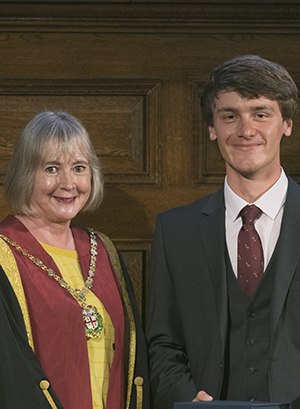 The full list of awards are as follows:
The full list of awards are as follows:
- RCVS Queen’s Medal: Professor Mike Herrtage FRCVS.
- Mind Matters Initiative Sarah Brown Mental Health Research Grant: Dr Katherine Wakelin from the University of Surrey for research on the effectiveness of online Compassion Focussed Therapy interventions for vets’ self-criticism and perfectionism.
- RCVS Student Community Award: Dr Paul Gogerty MRCVS; and Fergus Mitchell.
- RCVS Compassion Award: Dr Glen Cousquer MRCVS; and Katie Moore VN MRCVS.
- RCVS Honorary Associateships: Norma Chapman; Joyce Wason; and Jane Wilson.
- RCVS International Award: Miranda Luck RVN; and Professor Holger Volk MRCVS.
- RCVS Impact Award: Dr Liz Barton MRCVS; and Professor Clare Rusbridge FRCVS.
- RCVS Inspiration Award: Dr Alex Davies MRCVS; and Brian Faulkner FRCVS.
- RCVS Knowledge Veterinary Evidence Student Award: Sarah Daphne Foo, University of Sydney, Australia.
- RCVS Knowledge Awards for Quality Improvement: Donview Veterinary Centre; Anderson Moores Veterinary Specialists; Eloise Collins RVN; and Vets Now.
- RCVS Plowright Prize: Dr Herman Barkema, Professor in Epidemiology of Infectious Diseases from the University of Calgary, Canada.
Further information about each of the awards, as well as detailed citations about each of the award winners, is in the Royal College Day Programme, which can be downloaded from our Publications page.
VN Council Chair’s address
Following the bestowal of the various awards came the address from VN Council Chair, Matthew Rendle, in which he thanked his outgoing colleagues from VN Council, Jane Davidson and Liz Cox, welcomed the newly-elected members and gave an overview of the current state of the veterinary nursing profession.
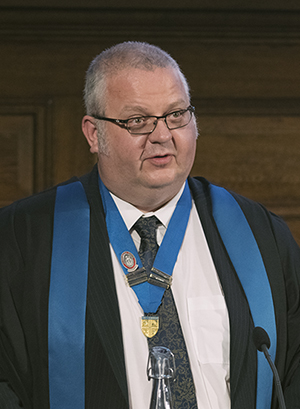 Matthew said: “While the worst of the pandemic may be over, its effects are lingering on, particularly in terms of pressures on the veterinary workforce, with VNs picking up a lot of additional work around the practice – all within the bounds of Schedule 3 of course.
Matthew said: “While the worst of the pandemic may be over, its effects are lingering on, particularly in terms of pressures on the veterinary workforce, with VNs picking up a lot of additional work around the practice – all within the bounds of Schedule 3 of course.
“The profile of the profession is improving, the public has a much better handle on who we are and what we do than they did 10 years ago and, in the long term, I am looking forward to an enhanced VN role in any future veterinary legislation.”
He also said it was necessary for the profession to continue to engage with the RCVS – whether that be by standing for VN Council or voting in its elections, responding to consultations on matters of importance for the profession, or getting involved in some of the VN Futures projects.
He added: “I’ve been very gladdened by the positive engagement we’ve had via the VN Futures project, in particular the School Ambassadors Programme, and it will be great to see veterinary nurses doing that all-important public outreach work with youngsters.
“On the subject of youngsters, over the next few months I will be doing one of my favourite things about this role – welcoming new veterinary nurses to the Register and celebrating the achievements of the profession, with dedicated VN Days in Manchester and Oxford.
“If ever you’re feeling a bit jaded – spend 10 minutes soaking up the energy and excitement of someone who’s about to join your profession and it will set you right.”
Matthew’s speech is available to read in full on our Features page.
Outgoing President’s address
Before the formal investiture of Melissa Donald as RCVS President for 2022-23, Kate Richards gave her final address as RCVS President.
She started by thanking her colleagues on the RCVS Officer Team, RCVS Council and College staff, as well as those from the veterinary organisations the RCVS had worked closely with over the course of the year. She also picked out her personal highlights of her presidential year as including the Workforce Summit, welcoming the new intake into the profession at the vet school graduations, the expansion of the support programme for refugee vets undertaking the Statutory Examination for Membership, as well as expanding to cover overseas-qualified veterinary nurses, and co-hosting the Federation of Veterinarians of Europe General Assembly with the BVA.
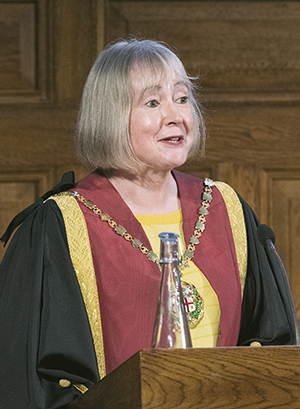 Turning to the key theme of her presidential year – Connections that Count – she said: “These connections have three dimensions. Firstly, connection with ourselves: eating, sleeping and living well so we can be well both physically and mentally.
Turning to the key theme of her presidential year – Connections that Count – she said: “These connections have three dimensions. Firstly, connection with ourselves: eating, sleeping and living well so we can be well both physically and mentally.
“Secondly, connection with our professions and everyone working in veterinary teams. It’s so important that the veterinary professions support one another to thrive in our chosen sector ensuring vets and vet nurses are engaged and nurtured to develop in their careers.
“Thirdly, connection is about collaborating and working with other professions to exchange knowledge and build partnerships for the benefit of animals, humans and wider society. I have been especially pleased in building the relationship with the Royal Society of Medicine and raising awareness of what the veterinary profession does which has a significant impact in challenging issues for the medical profession and social services.
“For example, vets, if they suspect a non-accidental injury in an animal, an injury that does not align with the clinical history provided, can breach client confidentiality (it’s explicit in the Code of Professional Conduct) and report this suspicion to the appropriate authorities. It’s a sobering thought, but by raising the lid on the possibility of an abusive household, a vet could be instrumental in saving someone’s life, maybe a child’s life. I am delighted to have spoken at two events hosted by the Royal Society of Medicine on the link between animal abuse and human abuse.”
On the subject of what she would be doing next, Kate detailed the course of her career – from farm vet, to Official Veterinarian, to veterinary advisor, to non-veterinary civil servant and then back into the heart of the profession through RCVS Council and her presidency.
“This presidential year has had its twists and turns, has stimulated and stretched me and thickened my skin. I have grown both personally and professionally. However, despite being surrounded by people it has, at times, been very lonely. Leadership is lonely, leadership of a regulator even more so,” she said
“My aim throughout the year was to listen and learn, to support and facilitate, to collaborate and connect. That was my intention, but I know I have not pleased everyone. I have developed a few more invisible scars, but these have made me more resilient, more reflective, more determined. It certainly has whetted my appetite for more, for what exactly I am not sure yet!
“Throughout my career, doors have opened due to a mixture of reasons. My own dogged determination, curiosity, desire to learn and be stretched, the thrill of experiencing new roles, meeting new people and making connections. The keys for these career doors have included people, experience and circumstances, some in plain sight and some not immediately obvious. It was about being open to opportunities.”
She added: “We have all come to this event from varying directions, with diverse experiences, from different backgrounds and differing perspectives. It’s all part of the fascinating tapestry of life and we are the richer for it. It is so important to understand and recognise what each of us brings, learn about each other and what has shaped us and to foster those connections.”
Kate’s speech is available to read in full on our Features page.
New Officer Team
After thanking her friends and family, Kate moved on to retirements from the Officer Team starting with Mandisa Greene as Senior Vice-President, whom Kate thanked for leading the College during less-than-ideal circumstances through her “characteristic positivity, resilience, and proactive attitude”.
With that, Kate formally handed over the presidential chain of office to Melissa and, in turn, received her past-President’s badge.
Melissa’s first role as new President was to say a few words about her predecessor. Referencing the theme of Kate’s year Melissa said: “Kate’s theme for her year was forging Connections that Count, and I think she has woven this throughout all her presidential activities. She’s done it through her outreach with the Royal Society of Medicine on One Health and issues related to the links between animal and other forms of abuse.
“She’s done it through her work with our European friends and colleagues at the FVE General Assembly in London. She’s done it through talking to MPs, Peers and Ministers about our proposals for large-scale reform of veterinary legislation. And she’s done it through innumerable meetings and informal conversations with members of the veterinary and veterinary nursing professions.
“She has forged these connections with her colleagues on Council and the Officer Team, with RCVS staff and with our many stakeholders, through her kind, patient and considered manner, her knowledge of the issues, and her intelligence.”
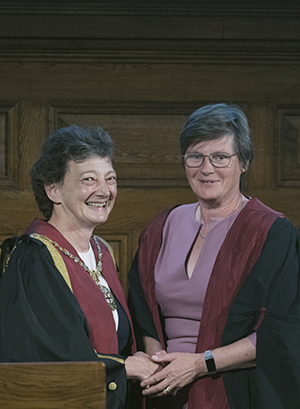 Next Melissa welcomed on board Sue Paterson (pictured) as Junior Vice-President, praising her pro-active and can-do attitude and her social conscience, as showed by her commitment to activities around making the veterinary professions more sustainable and reducing its carbon footprint, as well as around widening access to the veterinary professions for people with disabilities.
Next Melissa welcomed on board Sue Paterson (pictured) as Junior Vice-President, praising her pro-active and can-do attitude and her social conscience, as showed by her commitment to activities around making the veterinary professions more sustainable and reducing its carbon footprint, as well as around widening access to the veterinary professions for people with disabilities.
She said: “Sue will bring energy, experience, passion and challenge to her new role, as she has with all her previous ones, and will make us all the better for it. I very much look forward to her joining the Officer Team and can’t wait to start working with her.”
Guest speaker
Following an address from Melissa as the new RCVS President (as detailed above), Kate Richards went on to introduce her special guest speaker, Jim Green, Director of Operations at the British Animal Rescue & Trauma Care Association (BARTA) for his talk ‘Connections that count: integrating vets and emergency responders to meet societal needs.'
Jim, formerly a firefighter with Hampshire Fire & Rescue Service, spoke about how over his years with the service he had increasingly started to work with veterinary surgeons when responding to rescues involving animals in distress or that had been involved in accidents. This led to him forming connections with veterinary surgeons such as the former British Equine Veterinary Association (BEVA) President Josh Slater, former BVA President John Blackwell MRCVS and former RCVS President Dr Chris Tufnell FRCVS, and working with vets on designing protocols to ensure that fire & rescue officers and vets worked effectively together in emergency situations.
He told the audience how he and Josh Slater formed BARTA in 2012 as a coordinating body for vets who assist in fire & rescue operations involving animals, with the organisation’s first conference being held in Prague in 2015, and further connections formed with veterinary students and those involved in human trauma care and response. With BARTA becoming his full-time job in 2019 under the auspices of the Horse Trust charity, Jim said he was now making further connections with small animal emergency vets as well as the Scottish veterinary profession and fire & rescue service.
Following Jim’s guest speech, Kate formally closed Royal College Day 2022.